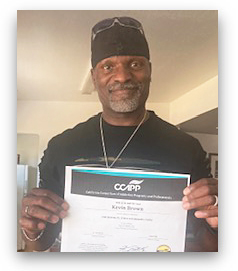
Raphael's journey to empowerment.
Raphael had reached a breaking point in his life, realizing that his attempts to break free from the cycle of addiction had been in vain. The familiar pattern of seeking detox, experiencing withdrawal, and then relapsing had taken its toll on him. This time, however, he was determined to make a real change. As he arrived at the detox center once again, Raphael contemplated the idea that perhaps detox alone was not enough. He needed something more comprehensive—treatment.
The decision to pursue residential treatment marked a significant turning point for Raphael. For the first time in a while, he knew he would have a stable roof over his head. But as the prospect of post-treatment life loomed ahead, uncertainty and fear began to creep in. In the past, he would often leave detox with good intentions, only to find himself confronted by the heavy burden of homelessness. It was a weight he simply couldn't bear sober.
During one of our conversations, Raphael confided in me about his belief that having a key and a hanger could make all the difference this time. It wasn't merely about the practicality of having a place to hang his clothes; it symbolized so much more. He saw it as the key to his success and stability. His words resonated with me, and I couldn't shake off the impact they had on me.
The next day, I made a life-changing decision. While I couldn't bring Raphael home with me, I realized that I could help provide him and others like him with a place they could truly call their own. I purchased a home for those who had no place to go after completing their treatment. Some may have had homes to return to, but the weight of their past often caught up with them, leading them back to the cycle of addiction.
And so, Raphael found himself holding a key to his own room, with a hanger and a closet to call his own. The newfound sense of stability began to transform his life. Soon after, he acquired a car—a symbol of independence and progress. The car required a key ring to hold both keys, adding to the jingling chorus that accompanied his steps. Raphael's experiences at America's Homeless Veterans showed him the power of positive energy and the willingness of others to help those in need. He discovered that if he asked for something, there were people ready to support him.
Motivated by this newfound empowerment, Raphael started attending AA meetings regularly, becoming a familiar face and a "frequent flyer" of the group. Eventually, he was asked to take on the responsibility of being the coffee guy, ensuring that coffee was made and available at every meeting. This role came with yet another key—the key to the cabinet where the coffee supplies were stored. With each new key, Raphael felt a growing sense of trust, accomplishment, and responsibility.
One day, Raphael was elected to chair a meeting—an opportunity that previously seemed far beyond his reach. From being an audience member, he found himself at the front of the room, guiding and supporting others on their own recovery journeys. With this responsibility came another key—the key to the meeting hall itself. The jingling of keys became a symphony of trust and empowerment for Raphael.
Every day, Raphael comes to my office to check in, reaffirming his commitment to stay on the path of recovery. He calls it "paying the rent," recognizing that maintaining his progress required continuous effort and dedication. He understood that success wasn't handed to him; it was something he had to work for and protect.
Raphael's story serves as a reminder that true transformation is possible through hard work, asking for help when needed, and taking responsibility for one's own life. Through the power of trust and empowerment, he not only rebuilt his own life but also became an inspiration for others in their pursuit of sobriety.
In the end, it was the keys—symbols of trust, stability, and progress—that unlocked Raphael's potential, opening doors he never thought possible.
Randall Britt
